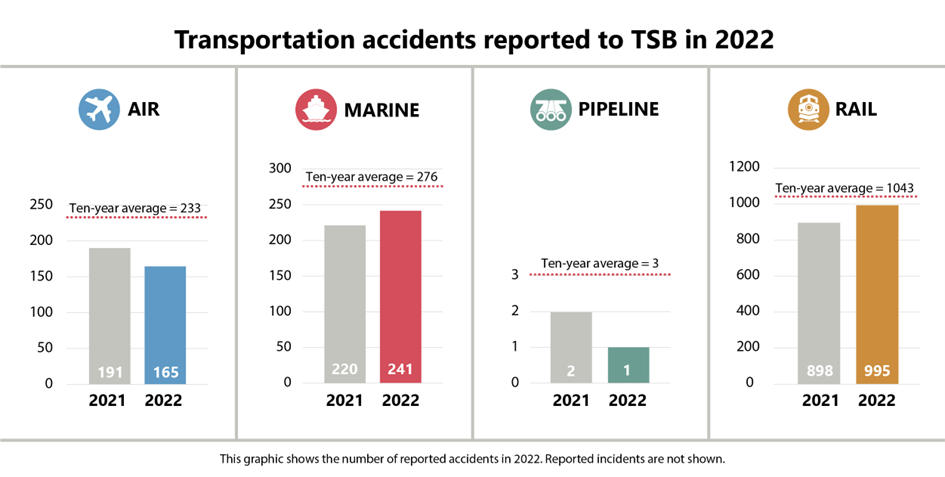Transportation Safety Board of Canada releases annual transportation occurrence statistics from 2022
Building on the preliminary statistics published in March 2023, the Transportation Safety Board of Canada (TSB) today released its final annual statistical summaries from 2022 on transportation occurrences in the air, marine, pipeline, and rail transportation sectors.
Air transportation sector
Air transportation in Canada slowly reverted to more normal patterns during 2022, after two years of significant disruption. Demand for business and vacation travel increased, while cargo activity remained high. Data collected by Statistics Canada indicates a total of 5.2 million aircraft take-offs and landings at Canada's major and select small airports. This was 14.1% higher than in 2021 and represented 84.9% of the pre-pandemic movements in 2019.
A total of 165 air transportation accidents were reported to the TSB in 2022 –14% lower than the previous year (191 accidents). Overall, the number of air transportation accidents has been decreasing in the last decade, with an average of 233 accidents reported annually in the 10 years prior.
In 2022, 24 accidents were fatal, resulting in 34 fatalities. This is slightly more than the 22 fatal accidents resulting in 31 fatalities in 2021 but is still 9% below the average of 26 fatal accidents involving 43 fatalities over the 10 years from 2012 to 2021.
Marine transportation sector
In 2022, 241 marine accidents were reported to the TSB, an increase from 2021 (220) but below the 10-year average (276). Sixty-one commercial fishing vessels were involved in shipping accidents, a slight increase from the previous year (49), but below the 10-year average (79).
Seven of the 241 accidents were fatal, resulting in seven fatalities, a decrease from the 11 fatalities reported in 2021, and below the 10-year average (15). Despite this decrease, commercial fishing remains one of the most hazardous occupations in the country, which is why commercial fishing safety has been on the TSB Watchlist since its inception in 2010.
Pipeline transportation sector
In 2022, a total of 67 pipeline transportation occurrences were reported to the TSB, a decrease of 42% from the previous year (116). This number is well below the average number of occurrences for the previous 10 years (112). Of these occurrences, there was one pipeline accident, compared to two in 2021. The accident took place in April 2022 (P22H0023) and involved a natural gas pipeline rupture and ignition of released product near Fox Creek, Alberta.
Of the total occurrences, 25 involved a release of product. While far lower than the previous 10-year average (64) this was a slight increase from the incidents with product release in 2021 (23). Twenty-one percent of pipeline incidents involved geotechnical, hydrotechnical or environmental activity (14), far below the 48% in 2021.
As in previous years, there were no serious injuries or fatalities arising directly from the operation of a federally regulated pipeline.
Rail transportation sector
In 2022, a total of 995 rail accidents were reported to the TSB, a slight increase from 2021 (898), but a 5% decrease from the previous 10-year average (1043).
Among these accidents, 111 involved dangerous goods, an increase from 2021 (86), but below the 10-year average of 121. Two of these accidents resulted in a dangerous goods release, the same as the previous year, but below the 10-year average of four.
There were 66 rail-related fatalities reported in 2022, an increase from 2021 (60), but below the previous 10-year average (70). Fifty-two of these fatalities were from trespassing accidents, an increase from the 41 reported in 2021. Trespassing accidents accounted for the majority (79%) of rail-related fatalities in 2022 followed by crossing accidents (21%), which decreased slightly to 14 fatalities in 2022 from 17 in 2021.
There were 37 accidents and 15 incidents involving the uncontrolled movement of rolling stock for a total of 52 occurrences . This is a slight increase from 2021 (48), but a 14% decrease from the 10-year average (61). The unplanned/uncontrolled movement of rail equipment was added to the TSB Watchlist in 2020, and remains an issue.
The TSB is an independent agency that investigates air, marine, pipeline, and rail transportation occurrences. Its sole aim is the advancement of transportation safety. It is not the function of the Board to assign fault or determine civil or criminal liability.
For more information, contact:
Transportation Safety Board of Canada
Media Relations
Telephone: 819-360-4376
Email: media@tsb.gc.ca
